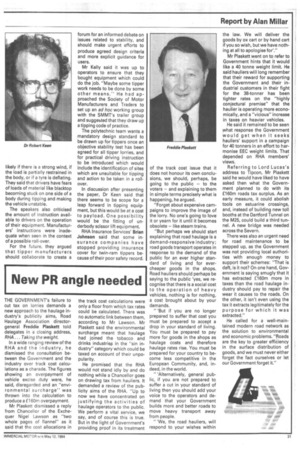I New PR angle needed THE GOVERNiVIENT's failure to cut tax
Page 33

If you've noticed an error in this article please click here to report it so we can fix it.
on lorries demands a new approach to the haulage industry's publicity aims, Road Haulage Association directorgeneral Freddie Plaskett told delegates in a closing address, RHA.., Taking the weight.
In a wide ranging review of the RHA and the industry, he dismissed the consultation between the Government and the industry over track cost calculations as a charade. The figures showing an overpayment of vehicle excise duty were, he said, disregarded and an "environmental surcharge" was thrown into the calculation to produce a £160m overpayment.
Mr Plaskett dismissed a reply from Chancellor of the Exchequer Nigel Lawson as "two whole pages of flannel" as it said that the cost allocations in the track cost calculations were only a floor from which tax rates could be calculated. There was no automatic link between them, according to Mr Lawson. Mr Plaskett said the environmental surcharge meant that haulage had joined the tobacco and drinks industries in the "sin industry" category which could be taxed on account of their unpopularity.
He promised that the RHA would not stand idly by and do nothing while a Chancellor goes on drawing tax from hauliers. It demanded a review of the publicity aims of the RHA. "Up to now we have concentrated on justifying the activities of haulage operators to the public. We perform a vital service, we say, and of course this is true. But in the light of Government's providing proof in its treatment of the track cost issue that it does not honour its own conclusions, we should, perhaps, be going to the public — to the voters — and explaining to them in simple terms precisely what is happening, he argued.
"Forget about expensive campaigns to improve the image of the lorry. No one's going to love. it or yearn for it until it becomes obsolete — like steam trains.
"But perhaps we should start explaining that road haulage is a demand-responsive industry; road goods transport operates in response to the demand of the public for an ever higher standard of living and for evercheaper goods in the shops. Road hauliers should perhaps be saying to the public 'yes, we recognise that there is a social cost to the operation of heavy vehicles, nothing is for nothing, a cost brought about by your demands.
"'But if you are no longer prepared to suffer that cost you must be prepared to accept a drop in your standard of living. You must be prepared to pay more for goods in the shops as haulage costs and therefore haulage rates rise. You must be prepared for your country to become less competitive in the European Community, and, indeed, in the world.
"'Alternatively, general public, if you are not prepared to suffer a cut in your standard of living then you should add your voice to the operators and demand that your Government builds more and better roads to move heavy transport away from people.
" 'We, the road hauliers, will respond to your wishes within the law. We will deliver the goods by ox cart or by hand cart if you so wish, but we have nothing at all to apologise for'."
Mr Plaskett went on to refer to Government hints that it would like a 40 tonne weight limit. He said hauliers will long remember that their reward for supporting the Government and their industrial customers in their fight for the 38-tonner has been tighter rates on the "highly conjectural premise" that the haulier is operating more economically, and a "vicious" increase in taxes on heavier vehicles.
He said it remained to be seen what response the Government would get when it seeks hauliers' support in a campaign for 40 tonners in an effort to harmonise EEC weight limits. That depended on RHA members' views.
Referring to Lord Lucas's address to Tipcon, Mr Plaskett said he would have liked to have asked then what the Government planned to do with its £160m roads tax surplus. As an early measure, it could abolish tools on estuarine crossings, and, instead of building new toll booths at the Dartford Tunnel on the M25, could build a third tunnel. A new bridge was needed across the Severn.
There was also an urgent need for road maintenance to be stepped up, as the Government was not providing local authorities with enough money to support their schemes: "That is daft, is it not? On one hand, Government is saying smugly that it has extracted £160m more in taxes than the road haulage industry should pay to repair the wear it causes to the roads. On the other, it isn't even using the tax it extracts legitimately for the purpose for which it was extracted."
He called for a well-maintained modern road network as the solution to environmental and economic problems. "Roads are the key to greater efficiency in the surface distribution of goods, and we must never either forget the fact ourselves or let our Government forget it."












































































































